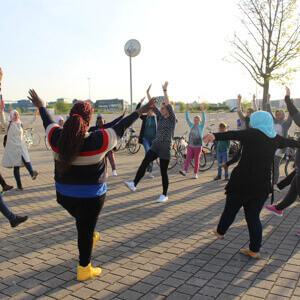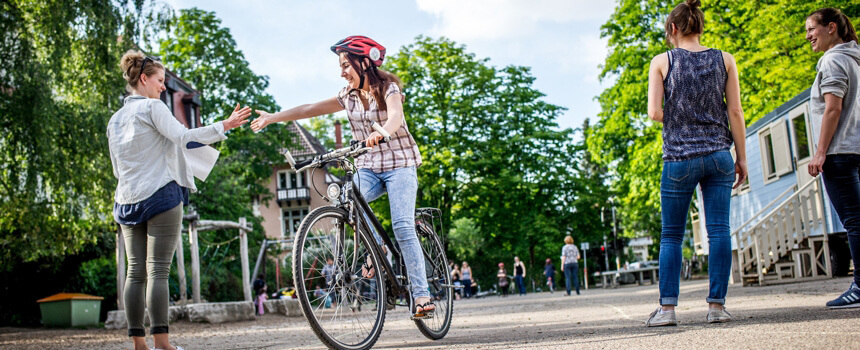 On your bike!
On your bike!
Empowering women refugees through learning to cycle
Freiburg im Briesgau has the reputation of being one of the most bicycle-friendly cities in Germany. According to a 2016 nation-wide poll conducted by the German Cycling Federation (ADFC), the city was voted third most bike-friendly urban area (ADFC, 2016). This puts Freiburg at the forefront when it comes to using the bike as a mode of transport. But cycling can be far more than merely a means of getting around. The American campaigner for women’s rights had already pointed out the emancipatory value of the bicycle in the 19th century. She revelled in the sense of freedom it afforded. At the time, owning a bike, which we today take for granted, was still something special in the US and Europe. In Germany, most people learn to cycle and thus experience this sense of freedom when they are young children. In the bicycle-town of Freiburg women refugees that have so far not learned to ride a bike will now also be able to have that experience.
Necessity
Social and cultural integration of women refugees as well as women with a migration background.
Activity
Volunteer trainers teach the refugee women to cycle as part of courses lasting several hours.
Countable effort
Number of cycling courses provided to women refugees.
Result
These courses teach the women to cycle and thus increase their opportunities for being mobile.
Systemic effect
Improved access to educational programmes and job opportunities, cultural events, social interaction and better integration.
Background
Numerous international conflicts today force more and more people worldwide to leave their homeland. Many new people have also arrived in Germany in recent years and are seeking refuge from war and persecution. According to statistics from the Federal Office for Migration and Refugees, 81,000 asylum applications were filed in the first half of 2018 – 42 percent of them by girls and women (BAMF, 2018). In order to facilitate and accompany the integration of refugees in Germany, numerous projects have been launched, including in the field of sports.
The North Rhine-Westphalia State Sports Association states that women with a migration or refugee background in particular are less likely to participate in sports clubs or take advantage of sports opportunities (Landessportbund Nordrhein-Westfalen e.V., 2017). There is a need for specific services that address the special circumstances of refugee women and break down access barriers to sports services. Cycling courses that are specifically geared to the needs of refugee women are one way of promoting the participation and integration of these women in society.
The good deed
The good deed allows the carrying out of cycling courses. Over several weeks the women learn to cycle in small groups. The bicycle enables the women to explore their new surroundings, to visit friends and family and provides inexpensive access to education, work and cultural life. This increases the social participation and mobility of refugee women. At the same time, it promotes women’s health and protects the environment. The good deed thus benefits women, society and nature.

AboutGermany
Berlin
Capital
82 521 653
Number of inhabitants
46.136
Gross domestic product per capita per year
5
Human Development Index
Germany is right in the heart of Europe. And with more than 82 million inhabitants, it is the most populated country in the EU. Since 2015, no other EU country has taken is so many refugees as Germany.
About the organization and further information
Association
Bike Bridge e.V.
Website
Further information and source
- Allgemeiner Deutscher Fahrradclub, 2016. Der ADFC-Fahrradklima Test. Die Ergebnisse 2016.
- Bundesamt für Migration und Flüchtlinge (BAMF), 2018. Aktuelle Statistik zu Asyl. 18.
- Landessportbund Nordrhein-Westfalen e.V., 2017. Weibliche Flüchtlinge im Sport. Herausforderungen und Potenziale für unsere Sportvereine.
- Walseth, K., & Fasting, K., 2004. Sport as a Means of Integrating Minority Women. Sport in Society: Cultures, Commerce, Media, Politics, 7(1), 109–12
- Garten- und Tiefbauamt Stadt Freiburg, 2016. Freiburg ist Fahrradstadt.
- Allgemeiner Deutscher Fahrradclub, 2016. Der ADFC-Fahrradklima Test. Die Ergebnisse 2016.
- Bundesamt für Migration und Flüchtlinge (BAMF), 2018. Aktuelle Statistik zu Asyl. 18.
- Landessportbund Nordrhein-Westfalen e.V., 2017. Weibliche Flüchtlinge im Sport. Herausforderungen und Potenziale für unsere Sportvereine.
- Walseth, K., & Fasting, K., 2004. Sport as a Means of Integrating Minority Women. Sport in Society: Cultures, Commerce, Media, Politics, 7(1), 109–12
- Garten- und Tiefbauamt Stadt Freiburg, 2016. Freiburg ist Fahrradstadt.




